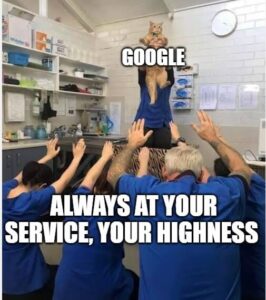A step-by-step guide to optimize your website’s SEO strategy and obtain maximum visibility.
SEO strategies are one of the main digital marketing tools that will make your brand grow exponentially, you can learn more in our article 5 marketing strategies for small businesses.
SEO in particular is directly linked to search engines such as Google, Yahoo!, Bing, Ask, etc. and the implementation of different optimization techniques on your website so that it appears organically in these search engines.
SEO specialization courses are essential if you want to be an SEO consultant or if you are dedicated to digital marketing as a community manager or copywriter for example. In case you are an entrepreneur, you want to discover how to position the publications of your product or service and you need to learn the basics, you are in the right blog.
What is SEO and how does it help your website?
SEO stands for Search Engine Optimization, the process of improving the visibility of a website in the organic results of any search engine.
Having a website for your brand or company is the basis of any digital presence, but the effort of creating it is useless if no one finds it.
It is important to note that SEO refers to organic results, that is, not paid, in that case we would be talking about SEM or Search Engine Marketing, the possibility of paying a cost per click to occupy the first places in a given search.
By optimizing your website, you can make sure that search engines index it correctly, that it has optimized content to attract users and invite them to stay on the page longer, providing a good user experience so that they are more likely to return. By following these steps, your website is sure to rank higher in search engine results pages and get more organic traffic, which in turn can lead to more conversions and higher sales.
If you are interested in learning more about this strategy, we invite you to read our article What is SEO?
Understanding SEO and implementing a good strategy is fundamental for the future of your brand.
- Improve your website.
Not only for search engines, but also for the users themselves. Improving the user experience means improving your results.
- It has a greater impact on social networks.
Because the links that are shared on the networks use titles and descriptions of your website that you have optimized according to a positioning strategy.
- Multiply your visibility.
With a good positioning in search engines you will get a large number of organic visits to your site, without having to pay for them.
- Trust and reputation.
When you appear among the first search results, users understand not only that your site contains the information they are looking for, but also that this information was approved by other users.
- Evaluate results.
You can measure results to see what works best and correct if you need to.
How to improve your SEO strategy in 5 easy steps
Before going to what we are interested in…
To carry out a complete SEO plan it is important to define two key SEO factors: authority and relevance.
The relevance of a web page depends on the response to the question or request formulated by the user to the search engines. To control this, we use on-site SEO techniques, whose objective is to make search engines understand what your content is and how it relates to user searches. It has to do with programming codes.
On the other hand, the authority of the pages depends on the amount of clicks that the web receives through links, the more clicks the better the page will be considered by search engines. Here we use off site SEO techniques, such as links to the web page, presence in social networks, etc. It is associated with link generation or link building.
Now that we have all the main concepts clear, we can ask ourselves the following questions
How to improve your SEO strategy?
Here are 5 basic and simple steps you can take to start improving your website.
With these tips in mind, you will be able to create a comprehensive SEO strategy that will help you achieve your goals.
Content
It is decisive for the ranking of a page. The more interesting, original and relevant the content, the more engagement and interaction it generates with the page, which informs Google that the website meets the demands of users, and therefore deserves to be well positioned.
It is essential to create quality content that attracts visitors and improves ranking, for this it is important to have a clear content marketing strategy for your website: topics you want to cover, keywords you want to target and the type of content (blog posts, videos, etc.) you want to create.
Once you have defined the content you need to optimize it. The best thing you can do is to privilege timeless guidelines, which generate traffic and interactions over time, and use images and videos intelligently.
It is important to remember that quality always trumps quantity when it comes to creating engaging content that will improve search engine rankings. In recent years, superficial content has been penalized and more extensive and relevant content, such as guides or articles, has been rewarded.
Keywords
As mentioned above, it is necessary to define keywords within your content marketing strategy. To do so, you must make an analysis that takes into account aspects such as search volume, competition level, seasonality and the relevance of the term for the brand.
Some of the best tools for keyword research are:
- Google Keyword Planner de Adwords (Google Ads)
- Semrush.
- Ahrefs.
- Keywordtool.
- Ubersuggest.
- Soovle.
Lately, keyword stuffing has been penalized, that is, when keywords are used excessively and repetitively. This gives us the guideline to think that although the use of keywords is important, it should not be forced or interfere in the flow of our discourse so that our users have a pleasant reading. And speaking of users, this brings us to the next point.
User experience
Lately, Google’s algorithms evaluate the user experience when ranking pages. Thus, pages with slow loading time, with broken links or little information, or designs whose interface does not adapt to cell phones are penalized.
That is why it is important to structure the content thinking about the reading experience, also so that the user feels at ease and spends more time on our website. How can we do this? By using SEO On-Page techniques such as keywords in titles, concepts highlighted in bold, resources such as lists, tables and infographics, images, videos, GIFs.
Link building
We have already talked about off-site SEO techniques, which have to do with the external references that the page receives. The more references it has, the more relevant and credible it will be for search engines.
Link building is a link strategy that can be really beneficial for your company. To carry it out it is necessary a strategic marketing planning focused on the generation of links.
Key points to keep in mind:
- Try to get links from different sources.
- Always quality before quantity. Google will detect if your links lead to sites with scarce or worthless content.
- The more links you have the better but always remember that quality is priority.
A tip that can help you in this instance is networking, that is, create real links with people or companies in your sector and look for opportunities to collaborate mutually.
Consistency
As in any strategy, you must have the constancy to measure the results it provides, evaluate them, update them and correct what you need. It is important to remember that SEO generates results in the medium and long term. It is likely that you will not see the changes overnight, this work is a process. That is why before making any modification you should allow some time for the search tool to process the information on your page.
It is important to be attentive to Google’s algorithm updates to be always in tune with what is required to obtain a good positioning.
Latest SEO trends
Surprise! Just a little more information for those interested in new trends.
- Machine learning and artificial intelligence: These tools should be taken as auxiliary because the content generated automatically with them will be considered SPAM. The best thing is always to know our audience and find our own voice when communicating.
- Voice searches. It is estimated that in 2020, 50% of searches will be done through voice, with technologies such as smart speakers or Google Assistant. This implies an important change in the way positioning is approached, as voice searches tend to be longer, more long tail and expressed in a more natural way.
- Google developed the Latent Semantic Index (LSI), a tool that allows understanding keyword variations, synonyms and related terms.





